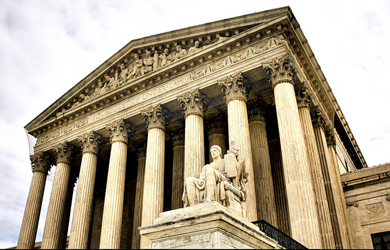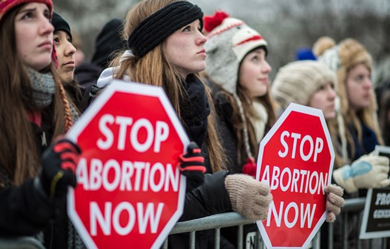This is the first post in a RWW series on the reemergence of the anti-choice “personhood” movement and what it means for the future of abortion rights in the U.S.
Part 2: The Personhood Movement: Internal Battles Go Public
Part 3: The Personhood Movement: Undermining Roe In The Courts
Part 4: The Personhood Movement: Regrouping After Defeat
“Welcome to the future of the pro-life movement.”
As a few dozen activists walked into a conference hall in an Atlanta suburb in October 2014, they were met with an optimistic greeting from an impromptu welcoming committee.
It was the founding convention of the Personhood Alliance, an association of anti-abortion groups from 15 states who are determined to wrest back an anti-choice movement that they fear has gone dangerously astray.
The members of the Personhood Alliance felt betrayed.
The largest and best-funded groups opposing abortion rights have, over the past several years, achieved astounding success in chipping away at women’s access to legal abortion in the United States. But these successes, Personhood Alliance’s founders maintain, are too small and have come at a grave cost.
In seeking mainstream approval for anti-choice politics, personhood advocates believe, groups like the National Right to Life Committee (NRLC) and Americans United for Life (AUL) have adopted a secular tone and downplayed their Christian origins. In focusing on drawing attention to issues like late-term abortion, they may have won some support for the cause but have done little to end the procedures they targeted. In seeking incremental successes, personhood advocates argue, the movement has given up on making a moral argument for the humanity of fertilized eggs and fetuses and lost sight of its larger goal of eliminating legal abortion entirely.
But the greatest betrayal in the eyes of these personhood advocates is the willingness of major anti-choice groups to endorse legislation that includes exceptions for pregnancies resulting from rape and incest. The personhood movement’s leaders contend that these political concessions are not only immoral and intellectually inconsistent, but also threaten to undermine the movement’s goals in the long term. In fact, the Personhood Alliance grew out of a feud between Georgia Right to Life leader Daniel Becker and NRLC centered around a rape exception inserted into a national 20-week abortion ban. Becker and his allies believe that they have a better plan, one that does not require compromise.
Joining the activists at the founding conference was Ben DuPré, the chief of staff for Alabama Chief Justice Roy Moore, who, along with his colleague Justice Tom Parker, has outlined an alternate strategy for eliminating legal protections for abortions in the United States: building a body of laws that define fertilized zygotes and fetuses as citizens with full rights under the law.
On the first night of the Personhood Alliance’s founding convention in October, Paul Broun, then a Republican congressman from Georgia, captured the activists’ anger at the leaders of the anti-choice movement, charging that they had betrayed the movement’s core principles to such a degree that it had provoked the wrath of God — and implied that they were doing so for personal gain.
Broun told the activists of a meeting he had had with two leaders of NRLC when he was running for U.S. Congress in 1996. He told them that were he elected, the first bill he would introduce would be a Sanctity of Human Life Act giving personhood rights to fertilized eggs, because [that’s] “how we’re going to overturn Roe v. Wade is by giving the right of personhood to that one-celled human being.” The NRLC leaders, Broun said, told him they wouldn’t support it and he “walked away very disillusioned.”
When an audience member asked Broun why he thought NRLC and other major anti-choice groups weren’t putting their energy behind personhood bills, including one that he helped write, Broun responded that he wasn’t “making any accusations here,” but implied that “pro-life” leaders have a financial incentive to never achieve their declared goal.
Harkening back to that 1996 meeting, he drew a historical parallel:
They never told me [why they wouldn’t back the Sanctity of Human Life Act]. I asked them, and they just said, well, we won’t. And I walked away from that meeting in 1996 very, very disappointed, very disillusioned. And shortly after, actually as I was riding away in a taxi cab, it came to mind, back when I was a kid – looking around the room, I’m not sure anybody’s old enough to remember polio – but when I was a kid I had classmates who got polio who were in iron lungs, and I had patients as a doctor, people who when I was in medical school, were people who had polio.
The biggest charity in this country was an organization called March of Dimes. And they were, their executives were, I guess, I’m not sure, but they were making lots of money, March of Dimes was probably the biggest charity in the country. And a doctor by the name of Jonas Salk developed a vaccine. And suddenly, March of Dimes went broke.
And I went away from that meeting with National Right to Life and I was wondering, I still wonder, I’m not making any accusations here: If we were to stop abortion, what would happen to the jobs of all those people who are getting paid every day to be in the pro-life movement? What would happen? I don’t know if that’s what it is or not, I’m not making any accusations, I’m just telling you what my thought was when I left that meeting.
He told the Personhood Alliance that every day that legal abortion continues, America risks God’s wrath. Discussing his 2013 refusal to vote for a 20-week ban to which the House GOP had added a rape exception at the last minute, Broun said:
If we can save some, let’s do it, but let’s not make exceptions and that some babies are worth killing and some are not. They’re all worth saving.
And then it goes back to ‘my people are destroyed for lack of knowledge,’ as we hear [from] Hosea 4:6, and that’s the reason education is so important. Because we’ve got to educate the grassroots.
…
You see, God is a holy, righteous God. He cannot continue to bless America while we’re killing over a million babies every single day. Abortion must stop.
(Broun’s estimate of one million abortions taking place every day is, to say the least, wildly exaggerated.)
Broun argued that groups like the NRLC are selling the movement short by accepting political compromise bills containing rape and incest exceptions and then pressuring anti-choice lawmakers to vote for those bills.
“The reason a lot of pro-life people are willing to compromise is because of that outside pressure,” he said. “Whether it’s an endorsement from Concerned Women [for America] or the Family Research Council or another group, or it could be an endorsement of the U.S. Chamber [of Commerce] or it could be the endorsement of any group. Politicians, the major principle that they will not budge from is their reelection. So they will do whatever it takes to get the endorsements, the money that they need to raise.”
Barry Loudermilk, a former Georgia Republican state senator who had recently been elected to the U.S. House, also spoke to the convention, comparing the fight against abortion rights to the struggle of America’s founders, who he said also witnessed “a decline in the moral sensitivity of our nation.” Loudermilk, who while serving in the state senate introduced a personhood amendment that was backed by Georgia Right to Life and Tony Perkins of the Family Research Council, said, “When you look at our movement, we have the exact same things against us that they had against them,” he said. “They had the government against them, the laws, the judges. We don’t have the people who are totally with us, it’s growing. But we have the truth with us. We have Providence with us.”
The congressmen echoed a founding tenet of the Personhood Alliance: that in a movement that was increasingly struggling to appear secular, the organization would be unabashedly “Christ-centered” and “biblically informed.”
As personhood’s proponents like to remind their fellow activists, both sides of the movement share the same goal: to completely criminalize abortion. The question is just how to do it.
The largest and best-funded anti-choice groups, deploying a strategy of chipping away at abortion access in the name of “women’s health,” have pushed state legislatures to pass over 200 new restrictions on abortion rights since 2011, many based on model legislation from AUL and NRLC. This strategy has managed to shut down abortion providers (especially in rural areas), make it harder for low-income women to pay for abortion, and erect unnecessary logistical hurdles for even those women who could access and afford abortion care.
The movement also won a pivotal court case with the Supreme Court’s ruled that private corporations could deny their employees legally mandated health insurance coverage for contraceptives that the corporations’ owners believe cause abortion. And they did this all while stemming the loss in public opinion that had hindered other “culture war” issues, in part by lifting up female leaders and adopting woman-centered empowerment rhetoric.
But at the same time, another side of the anti-choice movement, those eschewing compromise and incrementalism and pursuing the goal of establishing legal “personhood” from the moment of conception, have suffered a series of embarrassing electoral blows. In 2014, Colorado voters overwhelmingly rejected a ballot measure that would have defined zygotes and fetuses as persons in the state’s criminal code. It was the third time in six years that voters in the state had rejected a “personhood” measure, although its proponents noted that their margin of defeat got smaller each time. Perhaps even more galling for the movement, voters in reliably conservative North Dakota rejected an amendment to provide constitutional protections for “every being at every stage of development” by a whopping 28-point margin. And this all came three years after a personhood initiative was soundly defeated in deep-red Mississippi.
These personhood measures, while sharing the same ultimate goal as the incremental strategy, have become widely seen as politically toxic, in large part because they could threaten access to common forms of birth control. The no-compromise strategy has also become tied to a series of ham-handed comments made by male politicians, most infamously former Missouri Rep. Todd Akin, which further hurt the personhood movement, while providing political cover to those pursuing a more incremental approach.
But despite its spectacular losses at the ballot box, personhood movement strategists maintain that not only is their strategy the morally sound and intellectually consistent one — they believe their strategy is the one that will ultimately swing public opinion and overturn Roe v. Wade.
This series, marking the anniversary of Roe, will explore the recent resurgence of the personhood movement and what it means for the future of abortion rights. Upcoming posts will examine the history of the split in the anti-choice movement and its debates over legal strategy, and the organizations that are currently leading the movement.





